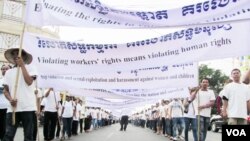WASHINGTON DC - While the United States is making a diplomatic pivot toward Asia, congressional staff say that should not mean letting up on pressure for more human rights.
In a discussion last week at the Heritage Foundation, a Washington-based think tank, Republican staffers said many Asian countries continue to commit rights abuses. This should be kept in mind, even as the administration of President Barack Obama considers better diplomatic relations, participants said.
Carolyn Leddy, a Republican and senior staff on the Senate Foreign Relations Committee, said the US needs to do more to protect human rights in Asia. “We need to be sort of re-pushing back,” she said.
The US has in the past sanctioned Cambodia for rights abuses, but it has warmed relations in recent years. Meanwhile, US diplomats have re-engaged with Burma, following democratic reforms there.
But Victor Cervino, a legislative assistant for Republican Sen. Marco Rubio, said the senator remains concerned about rights abuses there. “It is a very delicate situation,” he said, referring to the recent killing of 40 people and the burning of 800 homes in anti-Muslim violence.
Cervino said Vietnam had also seen a backslide in safeguards for human rights, while in China, Malaysia, North Korea and Tibet, major rights abuses are a concern.
Human Rights Watch said in an annual report these countries show are guilty of persecution, arbitrary arrest, the use of force to crack down on protesters and other abuses.
Eric Sayers, a defense policy adviser to Republican Rep. Randy Forbes, said last week that the US is refocused on a rebalance in policy toward Asia, but human rights must also remain a priority.
“That’s a role Congress can play,” he said. “I think we can play a larger role, not just in human rights, but speaking to other top security questions.”
Panelists also expressed concern for the Asean Human Rights Declaration, approved in November, which critics say falls below international standards and could allow member countries to commit rights abuses in the name of national security.
“I think our hope is, through the US presence now in Asean, that we are able to work with our friends in some parts of the region to strengthen that charter,” Cervino said.
Overall, panelists said the US pivot to Asia remains a partisan issue, since it involves differing policies on how to deal with North Korea’s nuclear threats, discussions with China and the ongoing disputes in the South China Sea, among other issues. And the pivot comes as the US is dealing with its own domestic issues, like the federal budget, they said.
Asia ‘Pivot’ Should Not Overlook Rights Abuses, US Republicans Say
- Sok Khemara
- VOA Khmer







